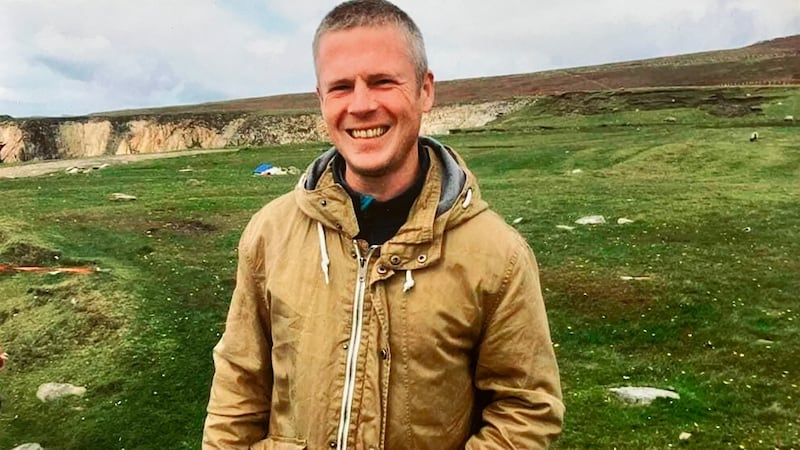The chief suspect in the case of missing English child Madeleine McCann has been acquitted of unrelated sexual assault charges, including the rape of an Irish woman, by a German court.
Christian Brückner faced three charges of aggravated rape, including the rape of Irish woman Hazel Behan (40), and two of sexual abuse of children, committed between 2000 and 2017.
During 10 hours of testimony over two days last May the Westmeath native insisted Brückner was the man who raped her repeatedly in June 2004 while she worked as a holiday rep, an attack that left her with lasting physical injuries and post-traumatic stress disorder.
On Tuesday morning, after 30 days in court, all charges were dismissed. Many trial observers had expected this outcome after the court, following a defence request, revoked the arrest warrant against Brückner last July.
RM Block
He remained impassive throughout the trial, declined to testify and denied the sexual assault charges he faced in Braunschweig.

Brückner has multiple previous convictions, including a 2019 sentence for the rape of a 72-year-old American tourist in Portugal in 2005. He is serving that sentence in Oldenburg, is set for release next year and at present faces no charges in the McCann case. Madeleine McCann went missing in Portugal in 2007.
The chief prosecutor in the case of the missing English child, Hans-Christian Wolters, said Tuesday’s ruling would be appealed and had no impact on the McCann investigation.
Brückner was first questioned by German police in 2013 as part of their investigation into the missing English girl and, in 2020, named as a chief suspect. His defence team have filed repeated petitions for those charges to be dismissed.
In closing arguments on Monday, chief defence lawyer Friedrich Fülscher insisted there had “never been sufficient suspicion” against his client and that the case had only come to court because of links to the Madeleine McCann case. He said there was not only a lack of evidence but that the witnesses who testified were “not credible”.

He accused the state prosecutor, who sought a 15-year prison sentence, of lacking “emotional distance” to the case and attacked criminal police for allegedly asking his client leading questions.
Mr Fülscher added that the Braunschweig trial had brought to light new evidence related to the 2005 rape of the 72-year-old woman, and that he would be filing a new challenge to the Brückner’s 2019 conviction in that case.
Chief prosecutor Uta Lindemann, in her closing arguments, said that lengthy disputes over jurisdiction had made it clear that the higher regional court in Braunschweig court had not wanted to hear the case. At times during questioning from the judge, she added: “one sometimes had the impression that it was [investigating] officials who were in the dock.”
As well as the attack on Ms Behan and the charges relating to children, Brückner was accused of raping a woman aged between 70 and 80 in her holiday flat and filming it. A witness in Braunschweig said he had seen the attack on video and recognised Brückner in it; however it had not been possible to identify the victim or the whereabouts of the video.
Ms Lindemann said she was particularly “shocked” by the court’s questioning of Ms Behan. The Irish woman approached British police after seeing a report into Brückner conviction for the 2005 attack with an image of him. She told police how her attacker, who remained masked during her ordeal, had blond hair, piercing blue eyes and spoke with a German accent. She also said he had a tattoo and a scar or birthmark on his upper leg.
In the Braunschweig court Ms Behan explained how she worked as a tour guide and lived in Portugal’s Praia da Rocha in June 2004 when, after a row with her then-boyfriend, she returned to her flat one evening and fell asleep in her clothes. She woke a short time later when someone called her name and assumed it was her boyfriend. She then saw a black-clad man and “felt a fear that I could never have thought possible”.
She remembers him telling her, in English: “‘Don’t f***ing scream or I will kill you’, so I didn’t.”
The four-hour assault ended in her bathroom, where the attacker covered Ms Behan with a sheet.
In tense cross-examination, Ms Behan was asked repeatedly how she could positively identify Brückner given her attacker was dressed entirely in black, covered up except for his eyes. Even in her darkened bedroom, Ms Behan said her attacker’s striking blue eyes “were just lights, so bright”. “It is bored into my skull,” she said, “I will never forget it.”
- Sign up for push alerts and have the best news, analysis and comment delivered directly to your phone
- Join The Irish Times on WhatsApp and stay up to date
- Listen to our Inside Politics podcast for the best political chat and analysis











